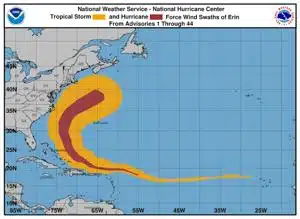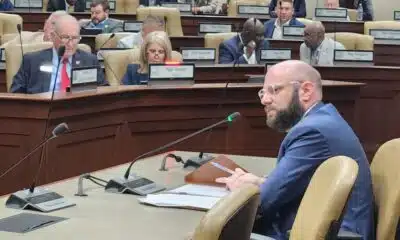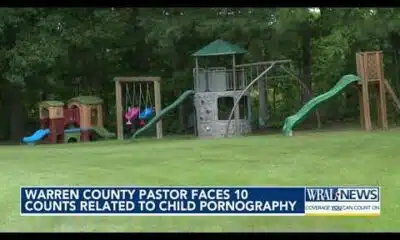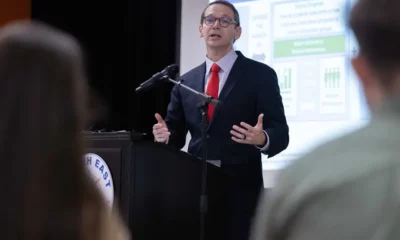News from the South - West Virginia News Feed
Feds direct states to check immigration status of their Medicaid enrollees
by Anna Claire Vollers, West Virginia Watch
August 22, 2025
This week, the Trump administration’s Centers for Medicare & Medicaid Services (CMS) announced an effort to check the immigration status of people who get their health insurance through Medicaid and the Children’s Health Insurance Program.
Medicaid is the public health insurance program for people with low incomes that’s jointly funded by states and the federal government. For families that earn too much to qualify for Medicaid but not enough to afford private insurance, CHIP is a public program that provides low-cost health coverage for their children.
The feds will begin sending states monthly enrollment reports that identify people with Medicaid or CHIP whose immigration or citizenship status can’t be confirmed through federal databases. States are then responsible for verifying the citizenship or immigration status of individuals in those reports. States are expected to take “appropriate actions when necessary, including adjusting coverage or enforcing non-citizen eligibility rules,” according to a CMS press release.
“We are tightening oversight of enrollment to safeguard taxpayer dollars and guarantee that these vital programs serve only those who are truly eligible under the law,” Robert F. Kennedy Jr., who oversees CMS as secretary of the U.S. Department of Health and Human Services, said in a press release announcing the new program.
As of April, roughly 71 million adults and children nationwide have Medicaid coverage, while another 7 million children have insurance through CHIP. Immigrants under age 65 are less likely to be covered by Medicaid than U.S.-born citizens, according to an analysis from health research organization KFF.
Immigrants who are in the country illegally aren’t eligible for federally funded Medicaid and CHIP. Only citizens and certain lawfully present immigrants — green card holders and refugees, for example — can qualify.
But some states have chosen to expand Medicaid coverage for immigrants with their own funds. Twenty-three states offer pregnancy-related care regardless of citizenship or immigration status, according to KFF. Fourteen states provide coverage for children in low-income families regardless of immigration status, while seven states offer coverage to some adults regardless of status.
The tax and spending package President Donald Trump last month cuts federal spending on Medicaid by more than $1 trillion, leaving states to either make up the difference with their own funds or reduce coverage. But the new law also includes restrictions on coverage for certain immigrants, including stripping eligibility from refugees and asylum-seekers.
Stateline reporter Anna Claire Vollers can be reached at avollers@stateline.org.
West Virginia Watch is part of States Newsroom, a nonprofit news network supported by grants and a coalition of donors as a 501c(3) public charity. West Virginia Watch maintains editorial independence. Contact Editor Leann Ray for questions: info@westvirginiawatch.com.
The post Feds direct states to check immigration status of their Medicaid enrollees appeared first on westvirginiawatch.com
Note: The following A.I. based commentary is not part of the original article, reproduced above, but is offered in the hopes that it will promote greater media literacy and critical thinking, by making any potential bias more visible to the reader –Staff Editor.
Political Bias Rating: Centrist
This article provides a balanced overview of recent policy changes to Medicaid and CHIP enrollment verification tied to immigration status. It presents facts, official statements, and statistics without emotive language or partisan framing. Both the rationale behind the policy, such as safeguarding taxpayer dollars, and the impact on immigrants are covered objectively. The inclusion of context on eligibility rules and varying state approaches reinforces a neutral, informative tone, typical of centrist reporting seeking to inform rather than advocate.
News from the South - West Virginia News Feed
Students go back to school in West Virginia, but same education debates rage
by Andrew Donaldson, West Virginia Watch
August 21, 2025
While students across the Mountain State are going back to school to advance to the next grade, many parents and most of the politicians seemed to be held back in the same spots with the same education arguments of the last few years.
News headlines and social media stories come one at a time on the as-needed basis as events and the business model dictate. But separate news items and viral debates over school choice, school funding, school vaccination requirements, school closings, school performance, and school staffing are variations on one theme: What is education, and who should control it?
That basic “who/what” question of intent and control is not unique to education issues. All political stories when reduced to their essences are stories about power and money. Education has become more and more a political endeavour, because of inherently involved power and money. As such, the rules of discerning politics apply far more than the traditional policy ideas and learning philosophies of what information goes into a student and how to evaluate the information coming out of a student. Add in the culture warring elements fueled by the modern marriage of news media and social media, and you have an environment that is heavy on the vibes and light on vocation.
The COVID-19 crisis is justifiably noted to be an inflection point in the push-pull world of policy and politics in general and education specifically. COVID — or more specifically the reaction by the people involved in running the institutions of American society from schools, to government, to health care, to social order — revealed the pre-existing flaws with a stress test that most everyone failed to one degree or another. While the high-minded ideals of learning, education and bettering the next generation were still recited as if the words themselves would magically manifest such things into malleable minds, reality told a different story.
Schools were closed, opened, closed again, re-opened with restrictions and not-ready-for-prime-time hybrid and online learning. Exceptions and standards had to be adjusted on the fly. Parents and the government had a tug-of-war over who could better understand an unprecedented crisis in public health and public trust with in-classroom teachers and their students as the rope.
The generation of students who lived through it heard all the buzzwords and platitudes, but weighed them against their lived experience, and found them wanting. Words said education matters, students matter, learning matters. Actions told them the priority of the education system was to be a giant jobs and funding program first, a daycare for parents second, and once that was all satisfied, perhaps you might learn something while being taught to pass a test to show what you learned.
Post-COVID, plenty of parents and politicians seem unable to let go of the tug-of-war rope. While the individual debates over issues like the vaccine exemptions, the ballooning cost of the Hope Scholarship, and debates over what should and shouldn’t be included in curriculum continue, perspective is badly needed that all these threads form the one cord of systematically educating students. The in-classroom teachers and students are on a treadmill that starts every August and keeps going until the following June. Education in the United States of America in the Year of Our Lord 2025 is very much a machine that does not stop.
The ever-entwined socio-political news and social media coverage of education runs at variable speeds, mostly parallel to the actual in-classroom education system. When the news narratives and social media attention does cross over into the real world education system, chaos and confusion are usually the result. Regardless of the chaos or the reason du jour, the in-classroom teachers have to press ahead with the students. While the algorithms and consultants keep us entertained, the pressure on an already overworked, underfunded and constantly criticized in-classroom environment is doing no one any favors.
Not that there ever was an era of magnanimous politics, but even with cellphones being banned from classrooms the rising generations of students have more information on current events than ever before. Those students aren’t just learning the curriculum; they are learning what the adults — teachers, parents, government officials, administrators — really think about them and their place in the education and political machines that drive America. And they are going to believe us.
GET THE MORNING HEADLINES.
West Virginia Watch is part of States Newsroom, a nonprofit news network supported by grants and a coalition of donors as a 501c(3) public charity. West Virginia Watch maintains editorial independence. Contact Editor Leann Ray for questions: info@westvirginiawatch.com.
The post Students go back to school in West Virginia, but same education debates rage appeared first on westvirginiawatch.com
Note: The following A.I. based commentary is not part of the original article, reproduced above, but is offered in the hopes that it will promote greater media literacy and critical thinking, by making any potential bias more visible to the reader –Staff Editor.
Political Bias Rating: Center-Left
The content presents a critical view of the current education system, highlighting systemic issues such as underfunding, politicization, and the impact of COVID-19 on schooling. It emphasizes the struggles of teachers and students within a politicized environment and calls for broader perspective and reform. While it critiques both political sides and the media’s role, the focus on social challenges and institutional shortcomings aligns more closely with center-left perspectives that advocate for systemic improvements and greater support for public education.
News from the South - West Virginia News Feed
WV groups call on Morrisey, McCuskey to push against end of federal solar program
by Lori Kersey, West Virginia Watch
August 20, 2025
A group of West Virginia environmental organizations is asking state officials to speak against the Trump administration’s move to end a Biden-era solar program that last year committed more than $100 million for projects in West Virginia.
The Environmental Protection Agency terminated the $7 billion Solar for All program earlier this month. The program was intended to help pay for residential solar projects for more than 900,000 lower income U.S. households.
Twelve organizations — including American Friends Service Committee of West Virginia, Appalachian Voices, Christians for the Mountains, and Citizens’ Climate Lobby of West Virginia — sent a letter Tuesday asking Gov. Patrick Morrisey and Attorney General J.B. McCuskey to speak against the program’s cancellation.
“We urge you to use every tool at your disposal to push back against this unwarranted action that will harm families and small businesses across West Virginia,” the organizations wrote.
The EPA granted the West Virginia Office of Energy $106 million in Solar for All funding last year. It also awarded money to 59 other entities.
According to the Office of Energy’s website, the grant was to be used to “deploy residential solar roofs, support home energy efficiency, reduce utility costs for low-income residents, and make West Virginia households more energy resilient.”
The program was scheduled to launch and start construction in 2026, according to a timeline listed on the website.
In a post on the social media platform X on Aug. 7, EPA administrator Lee Zeldin said the Big Beautiful Bill Act, signed into law last month, eliminated the Greenhouse Gas Reduction Fund, which included Solar For All.
“In some cases, your tax dollars were diluted through up to FOUR pass-through entities, each taking their own cut off the top!” Zeldin wrote. “The bottom line is this: EPA no longer has the statutory authority to administer the program or the appropriated funds to keep this boondoggle alive.
“Today, the Trump EPA is announcing that we are ending Solar for All for good, saving US taxpayers ANOTHER $7 BILLION!,” he wrote.
Zeldin said in a video that while the program was stood up in 2024, very little of the program’s money has been spent. Recipients are in the “building and planning phase,” and not the construction process, he said.
A spokesperson for the West Virginia Division of Economic Development, which oversees the Office of Energy, did not immediately respond to an email Monday asking how the local program would be affected by the cancellation and whether or not the state’s grant money had been spent.
In a news release, Quenton King, government affairs specialist for Appalachian Voices, noted that West Virginia officials applied for the funding in 2023, knowing “the value that solar energy brings” to the state.
“The Office of Energy was actively working out how to set the program up for success and lower electricity prices for West Virginia households, and it would be a waste to throw away that work now,” he wrote. “I hope that Gov. Morrisey and A.G. McCuskey work with the administration and our congressional delegation to restore the appropriated and obligated funding for this program.”
Representatives for Morrisey and McCuskey did not immediately respond to an email seeking comment Tuesday.
YOU MAKE OUR WORK POSSIBLE.
West Virginia Watch is part of States Newsroom, a nonprofit news network supported by grants and a coalition of donors as a 501c(3) public charity. West Virginia Watch maintains editorial independence. Contact Editor Leann Ray for questions: info@westvirginiawatch.com.
The post WV groups call on Morrisey, McCuskey to push against end of federal solar program appeared first on westvirginiawatch.com
Note: The following A.I. based commentary is not part of the original article, reproduced above, but is offered in the hopes that it will promote greater media literacy and critical thinking, by making any potential bias more visible to the reader –Staff Editor.
Political Bias Rating: Center-Left
The content presents a focus on environmental protection and opposition to the Trump administration’s termination of a solar energy program aimed at helping low-income households, which aligns with priorities common to center-left perspectives. The article reports concerns from environmental groups and officials about the impact of ending the program but also includes statements from EPA administrator Lee Zeldin explaining the rationale for cancellation, providing some balance. Overall, the piece leans slightly left due to its emphasis on environmental funding and social equity in energy access while maintaining a moderate tone without strong partisan language.
News from the South - West Virginia News Feed
Free AI testing platform rolled out to federal employees
by Paige Gross, West Virginia Watch
August 19, 2025
As a part of President Donald Trump’s AI Action Plan, which rolled out at the end of last month, the U.S. General Services Administration launched a platform Thursday that will allow government employees to experiment with artificial intelligence tools.
USAi.gov allows federal workers to use generative AI tools, like chatbots, code builders and document summarization, for free. The platform is meant to help government employees determine which tools could be helpful to procure for their current work, and how they might customize them to their specific needs, a statement from the administration said.
The tools will come primarily from AI companies Anthropic, OpenAI, Google and Meta, Fedscoop reported. OpenAI initially announced a partnership with the federal government last week, saying any federal agencies would be able to use ChatGPT Enterprise for $1 per agency for the next year.
“USAi means more than access — it’s about delivering a competitive advantage to the American people,” said GSA Deputy Administrator Stephen Ehikian, in the statement.
The GSA called the platform a “centralized environment for experimentation,” and said it will track performance and adoption strategies in a dashboard.
The platform’s creation follows Trump’s recently released plan to “accelerate AI innovation” by removing red tape around “onerous” regulations, and get AI into the hands of more workers, including federal employees.
The plan also calls for AI to be more widely adopted in manufacturing, science and in the Department of Defense, and proposes increased funding and regulatory sandboxes — separate trial spaces, like the USAi platform — for development.
A GSA official told FedScoop that before being added to the platform, AI models will be evaluated for safety, like whether a model outputs hate speech, its performance accuracy, and how it was red-teamed, or tested for durability.
But the GSA didn’t say how the introduction of USAi.gov would affect the federal government’s current tech procurement process, FedRAMP. The program, developed with the National Institute of Standards and Technology (NIST), provides a standardized way for government agencies to assess the safety and effectiveness of new tech tools.
“USAi helps the government cut costs, improve efficiency, and deliver better services to the public, while maintaining the trust and security the American people expect,” said GSA Chief Information Officer David Shive in a statement.
West Virginia Watch is part of States Newsroom, a nonprofit news network supported by grants and a coalition of donors as a 501c(3) public charity. West Virginia Watch maintains editorial independence. Contact Editor Leann Ray for questions: info@westvirginiawatch.com.
The post Free AI testing platform rolled out to federal employees appeared first on westvirginiawatch.com
Note: The following A.I. based commentary is not part of the original article, reproduced above, but is offered in the hopes that it will promote greater media literacy and critical thinking, by making any potential bias more visible to the reader –Staff Editor.
Political Bias Rating: Center-Right
This content presents a factual report highlighting President Donald Trump’s AI Action Plan and the introduction of a government AI platform, emphasizing deregulation and investment in technology infrastructure. The tone is neutral and informative but includes a focus on initiatives associated with a Republican administration, showcasing a pro-business and innovation-friendly approach typical of center-right perspectives. There is no strong partisan language or critique, placing the piece toward a center-right leaning stance.
-
News from the South - Texas News Feed7 days ago
Kratom poisoning calls climb in Texas
-
News from the South - Texas News Feed4 days ago
New Texas laws go into effect as school year starts
-
News from the South - Florida News Feed4 days ago
Floridians lose tens of millions to romance scams
-
News from the South - West Virginia News Feed7 days ago
Man sentenced to home confinement for deadly DUI crash
-
News from the South - Arkansas News Feed7 days ago
Arkansas lawmakers urge insurance department to ‘speed up’ regulating pharmacy benefit managers
-
News from the South - North Carolina News Feed7 days ago
Warren County pastor faces 10 counts related to child porn
-
News from the South - Florida News Feed5 days ago
Protesters go on strike in Israel demanding ceasefire and release of Gaza hostages
-
News from the South - Texas News Feed7 days ago
Five Texas school districts at risk of takeover















































